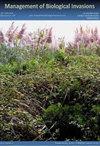对农民的采访表明,入侵的绿鬣蜥(鬣蜥)对波多黎各农业产生了直接和间接的负面影响
IF 1.2
4区 环境科学与生态学
Q3 BIODIVERSITY CONSERVATION
引用次数: 0
摘要
外来入侵物种对农业群落和作物生产产生了负面影响,病原真菌、寄生昆虫和杂草植物的影响已得到充分研究。哺乳动物和鸟类也被认为会影响农作物,但爬行动物,如非本地的绿鬣蜥(鬣蜥),通常不被认为是农业害虫。对非本地绿鬣蜥的研究主要集中在蜥蜴与本地物种的相互作用上,很少关注其对农业景观的影响。我们对波多黎各20个农场的农民进行了半结构化访谈,以探索入侵的绿鬣蜥对作物生产的影响,以及农民如何管理影响(如果有的话)。农民报告的55种作物中,有34种受到绿鬣蜥的负面影响。我们发现,20%的农场没有绿鬣蜥,10%的农场没有消耗作物,其余70%的农场造成了负面影响。负面影响包括作物损失和基础设施破坏,这对农民的行为、情感和经济都产生了影响。这些影响的具体结果是收入损失、翻新成本、作物选择的变化、管理成本和情绪压力。农民认为管理战略是缓解措施,要对作物产量产生任何积极影响,就必须保持不变。他们报告说,为了减少绿鬣蜥对作物生产的负面影响,他们使用了网格围栏、狩猎和家畜。在波多黎各,也许在其引进范围的其他地方,承认该物种是一种农业害虫是有必要的。农业推广机构应考虑就减少绿鬣蜥负面影响的策略提供指导,包括尽可能种植不易受影响的作物。本文章由计算机程序翻译,如有差异,请以英文原文为准。
Interviews with farmers suggest negative direct and indirect effects of the invasive green iguana (Iguana iguana) on agriculture in Puerto Rico
Agricultural communities and crop production are negatively impacted by invasive species, with the effects of pathogenic fungi, parasitic insects and weedy plants being well studied. Mammals and birds are also recognized as impacting crops, but reptiles, such as non-native green iguanas ( Iguana iguana ), are typically not considered agricultural pests. Research on non-native green iguanas has largely focused on the lizard’s interactions with native species with little attention given to its impact in the agricultural landscape. We conducted semi-structured interviews with farmers from 20 farms in Puerto Rico to explore the effect of the invasive green iguana on the production of crops and how farmers manage impacts, if any. A total of 34 of 55 crop species reported by farmers were negatively affected by the green iguana. We found that green iguanas were absent from 20% of farms, did not consume crops in 10% of the farms and caused negative impacts in 70% of the remaining farms. Negative impacts included crop loss and infrastructural damage, which had behavioral, emotional, and economic effects on farmers. Specific outcomes of these effects were revenue loss, refurbishing costs, changes in crop selection, management costs and emotional stress. Farmers considered management strategies as mitigation measures that needed to be constant to produce any positive effects on crop yield. They reported use of mesh fencing, hunting, and domestic animals as attempts to reduce negative effects of green iguanas on crop production. Recognition of this species as an agricultural pest is warranted in Puerto Rico and perhaps elsewhere in its introduced range. Agricultural extension agents should consider providing guidance on strategies to reduce negative impacts of green iguanas including cultivating less susceptible crops when possible.
求助全文
通过发布文献求助,成功后即可免费获取论文全文。
去求助
来源期刊

Management of Biological Invasions
Agricultural and Biological Sciences-Ecology, Evolution, Behavior and Systematics
CiteScore
3.40
自引率
6.70%
发文量
21
审稿时长
16 weeks
期刊介绍:
Management of Biological Invasions, established in 2010 by Dr. Elias Dana, is an open access, peer-reviewed international journal focusing on applied research in biological invasions in aquatic and terrestrial ecosystems from around the world. This journal is devoted to bridging the gap between scientific research and the use of science in decision-making, regulation and management in the area of invasive species introduction and biodiversity conservation.
Managing biological invasions is a crisis science, with Management of Biological Invasions aiming to provide insights to the issues, to document new forms of detection, measurements and analysis, and to document tangible solutions to this problem.
In addition to original research on applied issues, Management of Biological Invasions publishes technical reports on new management technologies of invasive species and also the proceedings of relevant international meetings. As a platform to encourage informed discussion on matters of national and international importance, we publish viewpoint papers that highlight emerging issues, showcase initiatives, and present opinions of leading researchers.
 求助内容:
求助内容: 应助结果提醒方式:
应助结果提醒方式:


